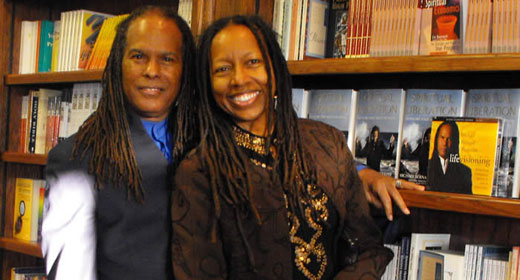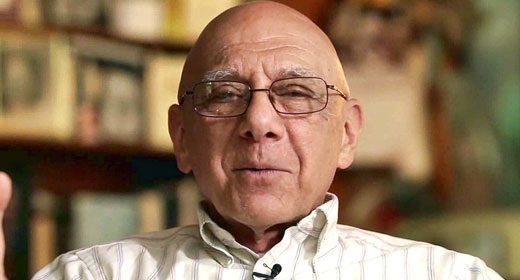An interview with Michael Beckwith & Rickie Byars-Beckwith
by Andrew Cohen:

Whether it’s soul music or soul food or finding one’s soul mate, the intangible quality commonly referred to as soul moves like a powerful undercurrent in contemporary culture. So we wanted to ask: What does it mean to be a living, breathing manifestation of this ineffable and yet most compelling dimension of human life? What does it mean to have soul?
To find the answer, we could think of none better qualified to respond than Michael Bernard Beckwith and Rickie Byars-Beckwith. This power couple represents the confluence of what many in Western society associate with soul and soulfulness—spirituality, love, music, community, and African-American culture. The late, great blues guitarist Mississippi John Hurt once remarked, “Soul . . . was nurtured by the Black Man in America.” And, as Rickie clearly demonstrates, the Black Woman, as well.
Dr. Michael Beckwith, a founding member of the Association for Global New Thought, is the guiding inspiration behind the Agape International Spiritual Center in Culver City, California. With more than nine thousand members, it is one of the largest multicultural, transdenominational spiritual communities in the United States. Dr. Rickie Byars-Beckwith, affectionately called a “grace note of God” and beloved for her inspirational music, is a composer, singer, and performer. She leads the Agape International Choir, a multiethnic 150-member choral group, whose a cappella prayer and rousing musical celebrations drive Agape’s Sunday services.
After attending a recent service at Agape, it was clear to WIEeditor in chief Andrew Cohen that one would be hard-pressed to find a fuller expression of soul that side of the Great Divide. In the following interview, Cohen engages Michael Beckwith and Rickie Byars-Beckwith in a lively and soulful exploration of the topic.
Andrew Cohen: What does it mean when we say that someone “has soul”?
Rickie Byars-Beckwith: To have soul, you must somewhere be connected to the divine presence. People who “have soul” have a certain way of expressing themselves. What they’re saying is real;they have the facility, the ability to touch you. There’s the sense that they’re not trying to transmit anything. Yet, transmission is taking place. They’re in tune. They have rhythm. They have an understanding of the way things are, and there’s a commitment to the heart. They have a natural way of being, and in their way of being, there’s something that is universally on point, whether they know it or not. For example, a soulful person may not necessarily be the one who dances well, but they may have a great appreciation for those who can! And in their love for it, they’re poised. Soulful people love; they have a connection to this greater love and to the divine. John Coltrane . . . he had soul.
Cohen: Is there another way to describe this capacity for soul?
Byars-Beckwith: When someone’s connected, when a person totally gets it, things come together. They’re not speaking from their intellect; they’re speaking from something greater. There’s something speaking through them that is it—that is beyond. It’s divine. It’s the ability to love; it’s not just the ability to care more. It’s creative love, as opposed to destructive love! It’s soulful. I mean “One Love” in the way Bob Marley meant it. It’s that love. It’s beyond self-preservation. It’s something that cares. In that love, there’s no other. We are it. It’s us, and so we share it. I believe that a soulful person is someone who is swimming in this, who’s dedicated to it, who’s here for this.
Michael Beckwith: That’s soulful! And I like the word “soul-ful.” There’s a rhythm; there’s a harmony, a vibration. And soulful people have the ability, consciously or unconsciously, to allow that vibration to move through them. Sometimes they don’t even know they’re doing it. Have you ever listened to Sam Cooke or Ray Charles? In the music of certain people, you hear them touching that ineffable place. They become instruments to translate and transmit it to the audience. And when it hits the audience, you canfeel it.
Soul can also be expressed in a person’s smile or in their movement. We talk about soul food. The food itself might not be any good—the actual substance that it’s made from—but a mother’s or a grandmother’s love infuses the food with something that transmits to the family, to the children, and carries them for a long, long time. In the same way, sometimes a musical artist will take a song written by someone else, a song that didn’t do that well when it was originally released. But when the artist takes that same song and those same lyrics and infuses them with soul, it becomes a hit.

Cohen: What exactly is it that they are infusing into that song, and how are they able to do it?
Beckwith: They’re in tune with something beyond the gross level, and it’s subtle and real. It’s eternal. It doesn’t go in and out of style. Every time you hear that soulful song, you think, “Wow, that does something to me!” Some people have the capacity to hold that space. And it’s love; it’s surrender; it’s availability; it’s sensitivity to that ground, to that frequency, to that vibration, to that rhythm. Some people have it in their walk or in the way they hug you or in the way they talk. Some people have it in their cooking. I think it’s expressed in all aspects of life. Everyone has it or has the capacity to have it, but some people don’t express it. I heard a speaker recently and everything that person was saying was right, but there was nomusic in it. He wasn’t in sync with what he was speaking about and so it didn’t touch me.
Cohen: Why do some people appear as if they don’t have soul?
Beckwith: I believe that everybody’s born with soul. We all have soul because we’re individualized expressions of this Great Good. We’re here as it. But in some individuals the expression of soul is not actualized because their intention for life may be different. As a result the person is out of time, out of step, and their attention and intention are off. They’re not in the flow of life. To be soulful, you have to flow.
Cohen: Two ways in which you have described soul are in terms oflove and realness. When someone’s “got soul,” you know it. Can you describe other qualities that define soul?
Byars-Beckwith: To be honest, I think it’s unsoulful to try to describe soul, but I’ll try anyway! It is love and realness. And it’stiming. There’s a time for you to express that song. Some people will know it’s time, and others won’t recognize it. We spoke about the songwriter who writes a song that doesn’t initially achieve popularity, a song that another singer comes along and makes a big hit. This happens because the singer feels he has a job to do. He is carrying the song in his being, and he is so deeply resonating with the lyrics that he magnifies them and increases their power.
Cohen: For example, Ray Charles singing “ Georgia.” It is hard to imagine anyone performing that song like he does.
Byars-Beckwith: I heard Ray Charles sing “ Georgia,” and I cried.
Cohen: So, when you hear Ray Charles sing “Georgia” and you cry, something very specific happens and everybody feels it. It comes alive.
Byars-Beckwith: Everybody gets it. And everybody cries because the song opens the heart and it makes you care.
Beckwith: The soul has the capacity to uplift, inspire, and bring out the best in other people. It gives a taste of the eternal. It hits you and it makes you vibrate at that same level. A soulful individual can help you remember a realm that’s deeper than yourself.
Cohen: When I was much younger, I went to jazz performances and I sometimes remember feeling that the universe was literally coming to life. Certain musicians were able to convey a powerful and compassionate emotion that would catapult people into nothing less than transcendent states of consciousness. It was powerful and overwhelming. But having the opportunity to meet some of these musicians backstage, I recall being shocked to see that the soulful, religious, spiritual feeling they expressed through their music often stood in stark contrast to the kinds of individuals they seemed to be. There can be this enormous split between an artist’s capacity to transmit soulfulness, majesty, and the spiritual wonder of life and death, and the individual’s actual moral and ethical state of development. So my question is: What is the difference between having soul and having moral virtue?
Byars-Beckwith: For people who are able to convey this kind of inspiration in a performance, I would say that’s the highest they can give us. Their performance is a window for the divine, but they may not live from that place. What we’re talking about is high art—art that’s connected—where love, virtue, and soul are the same thing. Hopefully one’s life will be an extension of that inspired moment, of that transmission. That’s the ideal, and in that, there will be awareness all the time.
Beckwith: To me virtue and soul are not the same. An athlete can run really fast, or a person can open up and a tremendous melody can come out of their mouth. An average person will say, “Ooh, they can run! They can do this or that!” But it doesn’t necessarily mean the performer or athlete has virtue or wisdom. It just means they have the facility. Even people who have been in the spiritual walk of life may have a mental facility and may know its tricks. They may have a siddhi of some kind. They may be able to manifest something, which can certainly mean that they’re in tune with the rhythm and the harmony within themselves; they’ve developed a certain part of their mind or their brain. But it doesn’t necessarily mean that they’re enlightened. It doesn’t necessarily mean that they’re the full package, in the sense in which we’re speaking about it.
Cohen: Is there another way in which to consider this dramatic split in some of the greatest artists? For example, Billie Holiday had a God-given gift and yet was incredibly self-destructive.
Beckwith: Sometimes that self-destruction or lack of self-love or depression is the opening for the transcendent to come through them. They’re humbled by their pain, and they release that pain in a song. But they don’t have the capacity or the wherewithal to have the rest of their life vibrate at a higher level.
Byars-Beckwith: And there’s someone like Marvin Gaye, who was brilliant. And Bob Marley. In our travels all over the world, I hear more Marvin and more Bob Marley than anyone else. That’s what they came to give. And their pain helped them sing better. It’s all connected.

Cohen: So from one perspective, there’s this profound split in the individual. But from another point of view, that split enables them to give their gift.
Byars-Beckwith: Yes, and it allhas to be considered.
Beckwith: That sounded very soulful!

















































